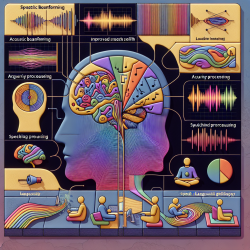As a practitioner in the field of special education, staying informed about the latest research is crucial to providing the best possible care for students. The research article "Treatment Effectiveness for School Age Children Who Stutter" by Sarah M. Smits-Bandstra and William S. Yovetich offers valuable insights into effective treatment strategies for children who stutter. This blog will explore the key findings of the study and provide actionable steps to help practitioners improve their skills in treating school-age children who stutter.
Understanding the Research
The study utilized a single-participant design to assess treatment efficacy for five school-aged children who stutter. Three experimental participants received treatment, while two served as no-treatment comparison participants. Outcome measures included:
- Speech samples
- Parent interviews
- Visual analogue rating scales completed by naïve judges
- Attitude and self-esteem tests
The results indicated that the experimental participants showed moderate improvements in fluency and speech attitudes compared to the no-treatment participants.
Key Findings
The study highlighted several important points:
- Children who received treatment showed moderate improvements in fluency and speech attitudes.
- Attitude change is crucial for long-term maintenance of fluency.
- Participants with severe stuttering and concomitant phonological delays showed partial improvements, indicating the need for more intensive or specialized programs.
Actionable Steps for Practitioners
Based on the findings of the study, here are some steps practitioners can take to improve their skills in treating school-age children who stutter:
1. Incorporate Cognitive Behavioral Therapy (CBT)
The study found that a combined cognitive behavioral therapy program was partially effective in alleviating both behavioral and attitudinal stuttering symptoms. Practitioners should consider incorporating CBT techniques such as self-monitoring, facilitating positive attitudes, and desensitization.
2. Focus on Attitude Change
Negative attitudes toward speaking can lead to relapse. Ensuring that therapy addresses these attitudes is crucial for long-term success. Tools like the Communication Attitude Test-Revised (CAT-R) can be useful in measuring and tracking changes in speech attitudes.
3. Provide Intensive or Semi-Intensive Programs
For children with severe stuttering, more intensive or semi-intensive programs may be necessary. The study suggests that programs with at least 100 hours of therapy are more likely to yield substantial gains.
4. Use Valid Outcome Measures
Incorporate a variety of valid and reliable outcome measures, such as percentage of disfluent speech time, words per minute, and percentage of words stuttered per minute. Parent interviews and visual analogue rating scales completed by naïve judges can also provide valuable insights.
5. Continue Professional Development
Stay updated with the latest research and best practices by attending conferences, webinars, and workshops. Networking with other professionals in the field can also provide valuable insights and support.
By implementing these strategies, practitioners can improve their skills and provide more effective treatment for school-age children who stutter. Continuous learning and adaptation of new techniques will ensure that we are offering the best possible support to our students.
To read the original research paper, please follow this link: Treatment Effectiveness for School Age Children Who Stutter.










